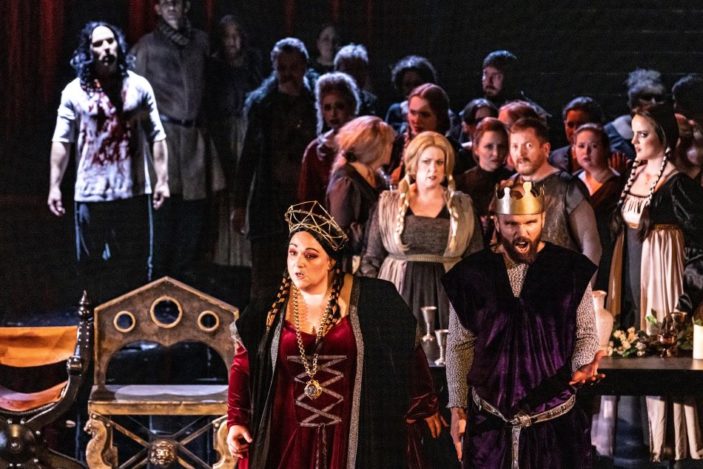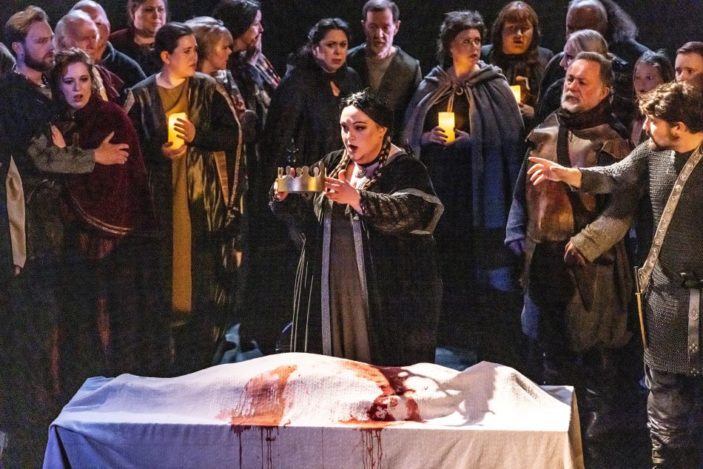
Macbeth is undoubtedly one of the world’s best-known tales of manipulation and betrayal. Cursed with future knowledge due to a witches prophecy, Macbeth strikes a deal with fate at the cost of his sanity and life.
Set in the eleventh century, an ambitious Macbeth (Simon Meadows) struggles against the passions of power and deception through his rise and eventual fall from the Scottish throne. As if haunted by the decisions he makes to take the throne, he becomes brash and paranoid. He sees recurring visions and ghosts of those he has betrayed in the king and Banquo (Adrian Tamburini).
His obsession with holding power leads Macbeth to desperate action through the second act, killing his close ally and the ‘Flower of Scotland’, Banquo. This killing catapults Macbeth into the throes of madness, claiming himself immortal and aiming at the deaths of Banquo’s children who are prophesied to take the throne.
Verdi himself was obsessed with Shakespeare and his reimagining of the tale as an opera spoke deeply to him, as he looked to live in an Italy freed from the social and political divisions of his era. Melbourne Opera was able to bring Verdi’s furious passions tangible, at Her Majesty’s Theatre with Simon Meadows’ Macbeth giving new life to the role.
An opera with a deep tradition, Melbourne Opera didn’t stray too far from the Italian original and kept true to the initial tale without the abstraction that some companies dabble with. The use of projections to deliver some of the most important spectres throughout the performance was highly effective.
Helena Dix‘s Lady Macbeth stole the performance with her compelling vocal work. A regular face in opera around the globe, Helena brought her expertise and formidable stage presence to the character role. Considered both a protagonist and antagonist within the story, Dix’s Lady Macbeth was compelling, showcasing the character’s sinister charm and quiet grief before her death.

While not taking prominence until the third act, Samuel Sakker’s Macduff stole the latter part of the performance in his unceasing drive for revenge. Sakkers strong tenor vocals gave the character of Macduff the desperate strength needed after the horrific death of his family to Macbeth’s hidden assassins.
Even as the tale moved into the final act and death’s unceasing hand moved closer to Scotland, in the end, it was all about Macbeth. As Meadows’ gave his final dying wails and famous monologue it hid a painful, yet graceful subtlety that followed Macbeth to the grave and the final curtain fall.
Props must be given to the set designer Gregory Carroll and lighting designer Rob Sowinski, whose formidable designs were able to capture the strength of Scotland whilst adding the menacing darkness and atmosphere that follows the horrific themes of Macbeth’s treachery.
Macbeth is a cautionary tale of woe, touching on the psychological cost of betrayal. Melbourne Opera’s rendition was able to touch on all the important elements of the beloved opera without needing to go to extremes, with Meadows, Dix and Sakker providing some stirring vocal highlights.
![]()
![]()
![]()
![]()
![]()
FOUR STARS (OUT OF FIVE)
Melbourne Opera’s telling of Verdi’s Macbeth is playing at her Majesty’s Theatre in Melbourne, running until the 26th of May. Tickets available HERE
In an Australian theatre first, the final performance of Macbeth on 26 May will be broadcast via LIVE VR to anyone with Virtual Reality headsets.
Tickets for the VR experience will be available soon, stay tuned to @MelbourneOpera to be the first to know.
All photos credited to Robin Halls
